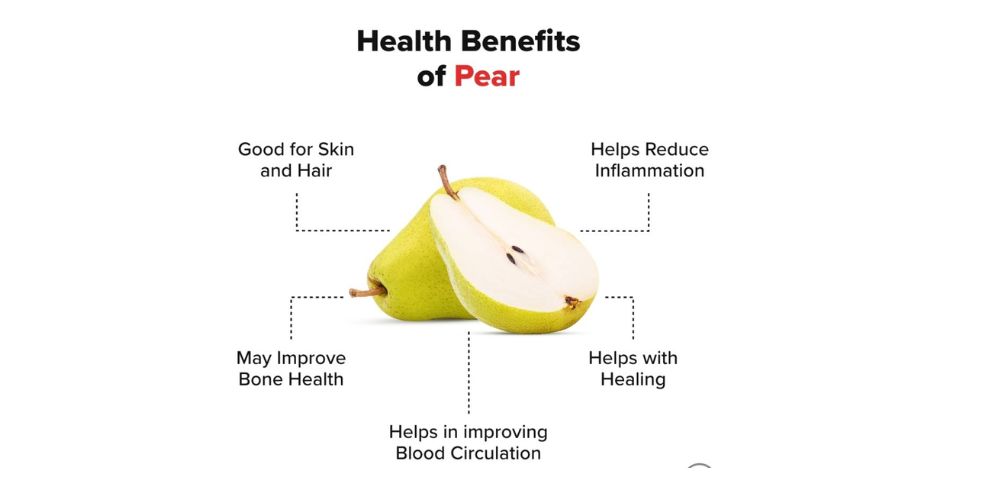There is a pear for almost everyone’s palate and aside from their delectable flavor, pears are also very nutritious. Their fiber content supports digestive health and blood sugar regulation, and the antioxidants in their skin can counter chronic inflammation linked with a variety of chronic diseases. Continue reading to learn more about pears’ health benefits, dietary addition suggestions, and the risks of eating too many.

Pear Fruit’s Nutritional Value
100 grams of pears contain, according to the USDA,
84 g of water
Energy: 57 kcal
15.2 g of carbohydrates.
3.1 g of fiber
Fat: 0.14 g
0.36% protein
Benefits of Pear Fruit on Health

Since ancient times, people have liked pears. These bell-shaped fruits can be eaten soft or crunchy and are sweet with a slight touch of sourness. They offer a wide range of wellness benefits that are supported by science and medicine. Let’s explore the health benefits of eating pears.
1. Improving Digestive Health
Both soluble and insoluble fiber, which are vital for digestive health, are abundant in pears. These fibers soften and bulk up the stool, which aids in maintaining intestinal regularity.
6 g of fiber, or roughly 21% of your daily needs, can be found in one medium-sized pear.
Pectin is a soluble fiber that is abundant in pears and has been linked to several advantages, including better gut health and immunological function.
Pectin, notably, might also aid in relieving constipation. 80 people with constipation got 24 g of pectin daily in the earlier 4-week study. Their levels of good gut flora got better and they no longer had constipation.
2. Helps in healing
Pears are a strong source of vitamin C, which aids in wound healing. Ascorbic acid aids in the production of new tissues in the various organs and cellular structures in the body. Therefore, it ensures that the affected region heals rapidly whenever there is a burn or cut. Pears could assist you to recover quickly if you are injured. Include them in your diet.
3. Reduces the risk of diabetes
Apple and pear eating are linked with an 18% lower risk of type 2 diabetes, according to a full meta-analysis involving more than 200,000 people. There was a 3% decreased incidence of type 2 diabetes when eating just one serving of apple or pear per week.2 This study shows a correlation, not a cause-and-effect but this association is intriguing and may point to a link between the consumption of certain fruits and diabetes risk.
Pears have a good source of flavonoids, an antioxidant kind, which may be one explanation for this. A different meta-analysis discovered that consuming more flavonoids is related to a lower risk of type 2 diabetes.
4. May have cancer-fighting qualities
Several substances in pears could have anticancer effects. Their anthocyanin and chlorogenic acid contents, for instance, have been demonstrated to offer cancer protection. According to a few studies, eating a lot of fruits, including pears, may help prevent certain cancers, such as those of the stomach and lungs.
Additionally, certain population studies indicate eating fruits high in flavonoids, which include pears, may protect against ovarian and breast cancers.
While eating more fruit may lower your risk of developing cancer, additional research is required. Pears shouldn’t be used in place of cancer treatment.
5. Phytonutrients to Reduce Inflammation
In particular, the skin of pears has a good source of phenolic acids, flavonoids, and triterpenes, which are antioxidant and anti-inflammatory substances. Inflammation is required to treat injuries and fight infection, but because it’s linked to so many chronic diseases, chronic inflammation can be damaging.
These phytonutrients aid in the neutralization of free radicals to avoid the oxidative stress that causes inflammation and is associated with conditions such as cancer, cardiovascular disease, diabetes, Alzheimer’s, Parkinson’s, and several eye illnesses.
Not only that, but pears’ high fiber content could boost their anti-inflammatory effects because fiber intake is linked to lower rates of inflammation.
6. Pears help to improve immunity.
Pears include vitamins C and A which help boost immunity. Pears are a fantastic source of antioxidants including vitamin C and minerals. The generation of white blood cells, which are essential to the immune system, is stimulated by antioxidants. In the end, this strengthens your immune system, enabling your body to fight off ailments like the flu, a cold, an upset stomach, and more. Antioxidants also shield the body from any harm brought on by free radicals because of their capacity to remove them.
7. May improve heart health
Pears may reduce your risk of developing heart disease. Their procyanidin antioxidants may lessen cardiac tissue stiffness, reduce LDL (bad) cholesterol, and raise HDL (good) cholesterol.
The quercetin found in the peel is a significant antioxidant that is thought to improve heart health by reducing inflammation and heart disease risk factors like high blood pressure and cholesterol levels.
One study found that eating two medium pears daily over a period of 12 weeks reduced heart disease risk factors like high blood pressure and waist circumference in 40 people with metabolic syndrome, a group of symptoms that raises your chance of developing heart disease.
A second 2015 study of more than 30,000 women found that eating 80 grams of fruit daily reduced the risk of heart disease by 6% to 7%.
8. Help in Weight Loss

Pears are a good place to start because they are high in fiber, which keeps you feeling full for longer. This stops you from eating at strange times. Pears are also one of the few fruits with few calories.
The fruit has a high water content, which increases its volume but decreases its caloric content. Pears also support healthy digestion, which is essential for effective weight loss. Constipation is fought off by it. And as is well known, good weight loss and a healthy digestive system are related. Pears are the ideal fruit for weight loss because of all of these characteristics.
Summary
Since ancient times, pearls have been prized for their wealth of health advantages. They support healthy skin, hair, and bones since they are high in vitamins and minerals. The anti-inflammatory properties of pears can help those suffering from illnesses like arthritis by reducing pain and swelling. Their iron and copper level promotes faster wound healing and blood circulation. Pears may have anti-cancer properties as well as benefits to the heart and immune system. Due to their high fiber and water content, they may also help with weight loss by improving gut health, decreasing the risk of diabetes, and lowering blood sugar levels. Pears are an amazing and nutritious food choice for overall well-being because of their great taste and many benefits.








